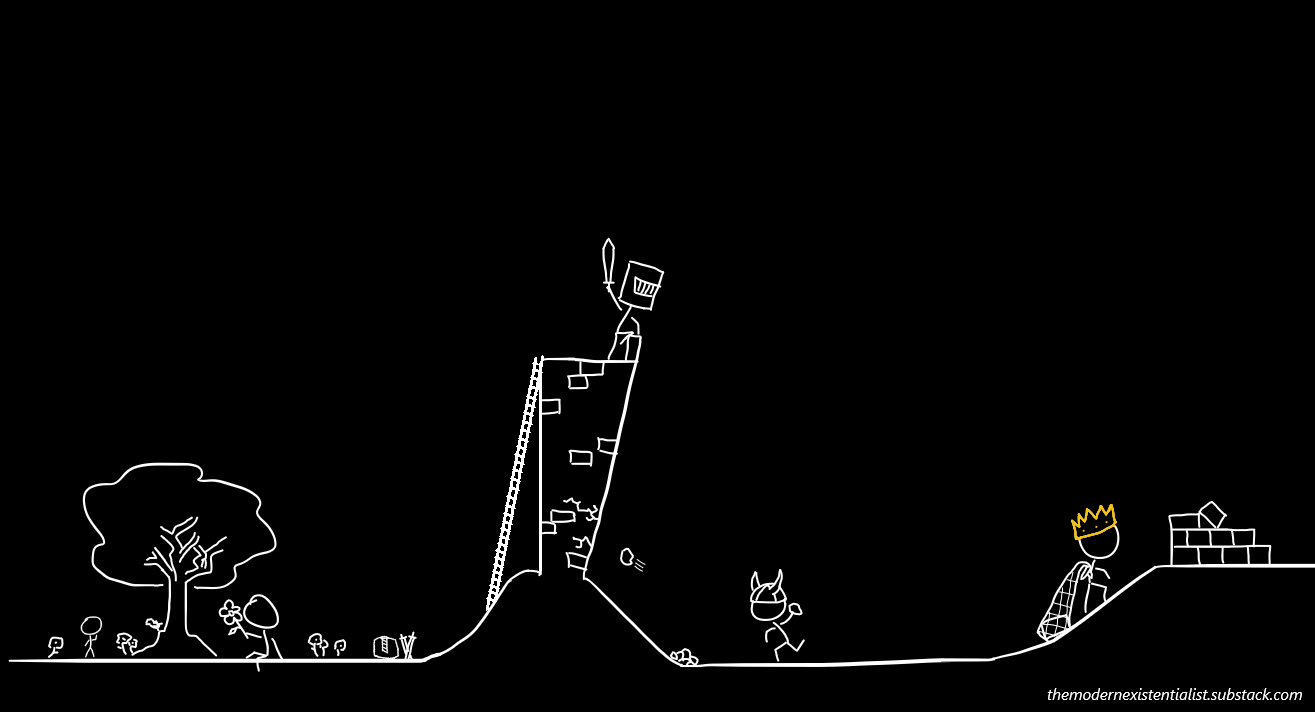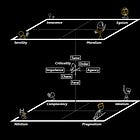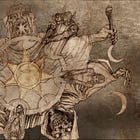5 | PRAGMATISM : the Adept
Method & Madness | Book II : Archetypical Philosophies
To the passionate man, the object of his passion is all that matters. He experiences life with an intense fervor, committing all of his energy and attention to his one pursuit. He risks thus becoming so consumed that he forgets that this passion is not an absolute, becoming blinded to ambiguity. He risks becoming trapped in a narrow existence—enslaved to and driven on by one single, all-consuming goal.
—S. de Beauvoir (ab. M. Hise)
The Righteous and Cynical could stand to bicker forever, yet still never reach a conclusion. A hero might slay any number of foes—yet still, their war never end. And so, when eventually they both tire of their fight at the base of the wall, they’ll wander off into the wilds:
A feral world, lawless and free.
There, in those wild lands, the nature of reality becomes clear to see. The world is Chaos, and Order is made—created by human hands. Order emerges—is born of Chaos—brought into being via human action; by means of aggregate Agency.1
Here, in the wildlands, the Idealist can cling no longer to his faith that the world is a place of inherent Order—after all, he can see with his own two eyes that the vast world beyond his cradle is steeped in Chaos; irreverent, and timeless. The Nihilist, too, must here acknowledge the sheer utility of his own Agency; that is, that—in spite of Chaos and any ultimate futility—he still doesn’t really want to get eaten by a bear. It’s clear that Order makes life easier, and so he must acknowledge that—at least, in the here-and-now—the walls and lies raised by other men can help him to persist and survive.
Thus is the Pragmatist born: the one who has witnessed—and so finally understands—that Order is born at the convergence of Chaos and Agency.
Taking hold of this new knowledge, the Pragmatist lays new foundations for home; a garden and cradle, finally all his own. He raises a wall against the wilds and bounds Chaos to the outside world, creating a safe and Ordered space—a place which exists beneath his authority and adheres to his rule of law. In a world absent an Absolute promise, he raises a Social one instead—a fortress and Eden all his own, made to protect everything that he loves: the people, projects, and purpose which he’s chosen for himself.
And so, the Pragmatist is the Adept—a man possessed and consumed by his goals; who dedicates his existence and all his Agency to the things which he loves. In them, he chases purpose and meaning, and—in spite of the primal Chaos he knows—still chooses to invest the entirety of his being into cleaving Order from an Absurd world.
Thus, the Pragmatist is the one who believes that there are two kinds of people in this world:
The noble, and the base.
There are those who have proven themselves worthy of respect, and those who’ve proven that they’re trash. There are those who’ve earned the right to be called friends, rivals, or peers… and then, there are those who choose to waste their time and their lives—squandering their Agency, undermining their potential, and ultimately wasting their existence.
The Pragmatist toils away at his projects, working himself to the bone. He chases his dream of Eden—of home—a place and a purpose to call his own. But an Adept is still just one man alone—and one person, no matter how capable or skilled, can only do so much. Thus, he comes quickly to realize that, if he hopes at all to succeed, he’ll need allies—followers, laborers, or brothers-in-arms—who would answer his call and lend him their Agency.
And so, the Pragmatist raises walls and wonders—soaring towers and an ivory spire, high into the sky—lifting his bright new world of Order above the sea of Chaos below. In so-doing, however, does he risk venturing too close to the sun—of raising himself up so high that he begins to lose sight of the world below. In his paradise above the clouds, he may yet begin to convince himself that his works could become new Absolutes. So possessed may he be by the beauty of his creation that he becomes blinded to its danger:
That he now always stands just one slip—one push—away from tumbling to his doom.
Philosophy: a mindset. a worldview. The way that one chooses to see the world, and thus approach living one’s life.
Αρχή | archí: origin
Τύπος | týpos: form
An Archetypical Philosophy is the logical basis of a person’s attitude, derived from observation of how he-or-she chooses to exist.
For the purposes of this discussion, at least. In the first-principles context of physics, it could be argued instead that base-reality is fundamentally Chaotic, and that Order emerges at the limits of possibility—i.e. the laws which govern Chaos. It could then be further argued that consciousness, animal-Agency, and Social Order are therefore derivative functions of these limits of physical Order.

















